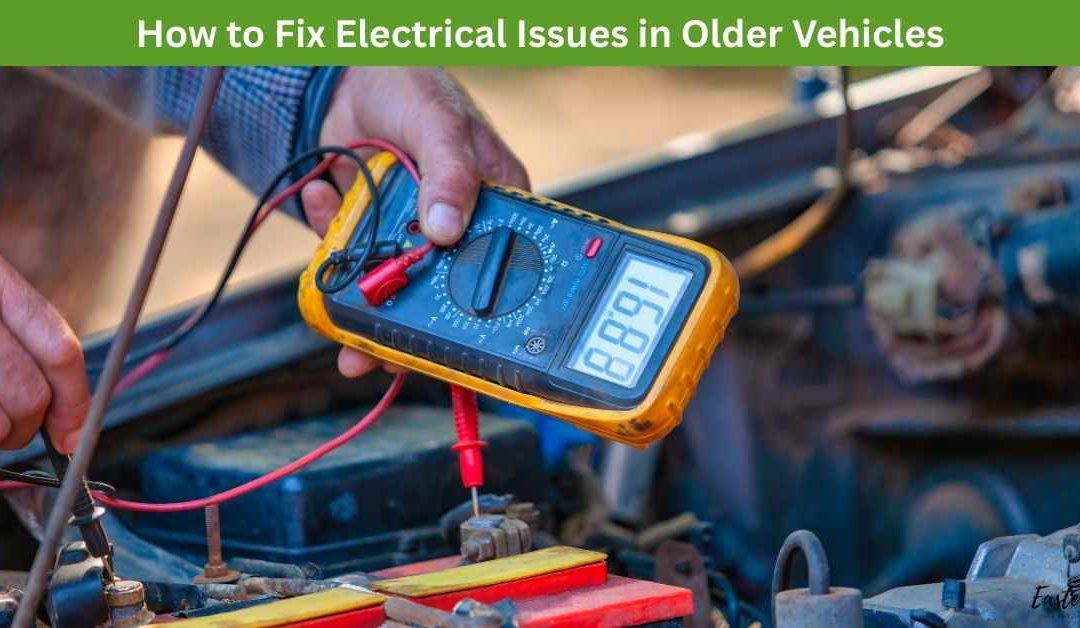If you own an older car, chances are you’ve dealt with some kind of electrical gremlin – flickering headlights, a radio that cuts out, or maybe windows that refuse to go up or down. Unlike newer cars packed with computerised systems, older vehicles rely on simpler wiring, but that doesn’t mean electrical problems are always easy to pinpoint. The good news is that with a bit of know-how (and sometimes a mechanic’s help), you can keep your car’s electrics in decent shape.
Common Electrical Problems in Older Cars
Flat or Weak Battery
One of the most common culprits is the battery. Older cars often sit for long periods, and batteries naturally lose charge over time. If your car struggles to start or the lights dim when you crank the engine, your battery might be on its way out.
Alternator Troubles
The alternator charges your battery while you drive. If it’s faulty, the battery won’t hold charge for long. A warning sign? The battery light glowing on your dashboard or headlights that dim when you turn on other electronics.
Faulty Wiring or Loose Connections
Over time, wires can corrode, become brittle, or even get chewed on (yes, rodents love engine bays). Loose connections can cause intermittent problems, like the radio working one day and not the next.
Blown Fuses
Older vehicles often suffer from blown fuses due to wear or overload. If one feature (like indicators, wipers, or the horn) suddenly stops working, check the fuse box first.
Starter Motor Issues
If you turn the key and hear a click but the engine doesn’t turn over, your starter motor could be worn out. This is common in cars that have clocked up plenty of kilometres.
DIY Checks You Can Do
- Inspect the Battery
Pop the bonnet and check for corrosion on the battery terminals. A simple clean with a wire brush and some baking soda solution can restore a good connection. - Check the Fuses
Most cars have a fuse box under the dash or in the engine bay. Replace any blown fuses with the same rating (don’t go higher – it can cause damage). - Test the Lights
Switch on your headlights, brake lights, and indicators. If they flicker or are dim, it might be a battery or alternator issue. - Look for Loose Wires
Gently wiggle wires around the battery, alternator, and starter motor. If something feels loose, tightening the connection may solve the issue. - Listen for Odd Sounds
A whining noise when revving the engine could point to alternator problems, while repeated clicking often means the starter motor needs attention.
When to Call a Mechanic
Some electrical issues aren’t DIY-friendly. If you suspect a faulty alternator, a failing starter motor, or hidden wiring issues, it’s best to call in a professional. Auto electricians have the right tools to trace and fix wiring faults quickly.
A Word of Caution
Electrical problems shouldn’t be ignored. A faulty wire can drain your battery overnight, and in worst cases, damaged wiring can even be a fire risk. If your car is older and seems to have one issue after another, you’ll want to weigh up the cost of repairs versus the value of the car.
Keeping It Simple
Electrical issues in older vehicles can be frustrating, but they’re often fixable with some basic checks. Start with the battery and fuses, and don’t be afraid to ask a mechanic if things get complicated.
And if your car is at the stage where the wiring seems to be held together by tape and hope, it might not be worth throwing more money at repairs. That’s where we step in – we buy cars in any condition across Melbourne, so you can turn that problematic old vehicle into quick cash and move on to something more reliable.
If you are in Ringwood, and looking for cash for cars, below is the best way to visit us.
Eastern Cash For Cars
720 High St Rd, Glen Waverley, VIC 3150
(03) 7035 7830
www.easterncashforcars.com.au


Recent Comments